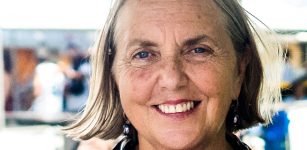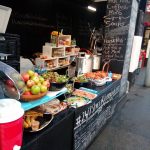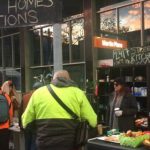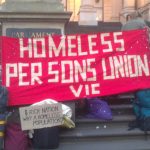Curbing Homelessness: An Interview with Senator Lee Rhiannon

On June 24, City of Sydney rangers moved in to shut down Sydney’s 24-7 Street Kitchen and Safe Space, which had been operating in the CBD since December. The operation had been providing free meals for the city’s needy, and a secure place to sleep for around 38 to 65 rough sleepers each night.
As council rangers began removing items from the setup, Lendlease building site workers started boarding up the area beneath the construction hoardings, where the city’s homeless had been sheltering at 60 Martin Place.
During the eviction, a representative from Housing NSW assured street kitchen organiser Lanz Priestley that his department would be providing temporary accommodation to the community at the site, and they’d eventually be provided with longer term housing.
It was a victory for the volunteers, who’d been running the safe space for months. And the street kitchen itself merely moved across the way. Today, it sits defiantly out the front of the Reserve Bank, still serving hot food and providing a range of services around the clock to Sydney’s homeless.
Support from Canberra
Early on the morning of the eviction, Greens Senator Lee Rhiannon was at Martin Place to lend her support. It wasn’t the first time she’d paid a visit to the safe space and kitchen, which she described as an “incredibly important” service.
“It’s unconditional. And it’s how governments should work,” the senator said that morning.
Situated across the road from the doors of the NSW parliament, the setup also drew the attention of parliamentarians to the ever-increasing homelessness situation in this city.
On the night of the last headcount in February, there were 948 homeless people in Sydney city, which is a 28 percent increase since 2011. On that night, the city’s temporary accommodation was at 91 percent capacity, and yet there were still 433 people sleeping out on the streets.
Ms Rhiannon has been a tireless campaigner for the rights of the nation’s homeless. After a City of Sydney representative handed out eviction notices referring to the Martin Place operation as a “public nuisance,” she remarked, “This statement from the city council shows how ruthless it is.”
Pushing for tighter gun restrictions
Another key concern for Senator Rhiannon is gun control. Last March, the Turnbull government quietly published the 2017 National Firearms Agreement. There was no public announcement, the document simply appeared on the attorney-general’s website.
Senator Rhiannon has accused the Coalition of sidling up to the gun lobby. Over recent years, gun laws around the country have been watered down. And the new agreement paves the way for the importation of weapons, such as the controversial Adler rapid-fire shotgun.
This last week has seen Lee Rhiannon surrounded in party room controversy. But the senator took the time out to speak with Sydney Criminal Lawyers® about the need to put a cap on the housing affordability crisis, the gun trading habits of government, and the strength of progressive thoughts.
Firstly, Senator Rhiannon, on June 24, the City of Sydney council evicted the Martin Place Street Kitchen and Safe Space.
What did you think about the service this grassroots operation was providing to help out so many of the city’s homeless?
The service was excellent. The way the safe space was run was outstanding. It was well organised, very safe, welcoming and inclusive.
I was down there a number of times. I was very impressed about how they were working to provide services for people to get homes. And they were successfully able to house a number of people by working with different providers.
As the council moved in to shut down the safe space, a representative from Housing NSW notified the organisers that the department would be providing the Martin Place rough sleepers with firstly temporary and then permanent housing.
We contacted the department last week and they said that more people will continue to be housed in long term properties.
Last weekend, most of the rough sleepers had left Martin Place and moved into temporary accommodation. Do you expect that these people will eventually be placed in permanent accommodation?
It’s interesting that you say permanent. Because on that Saturday June 24, I was down there for about six hours and spoke to the people from Housing NSW, and they said it wasn’t permanent, but it was temporary housing for 28 days. So this was the first mention of permanent housing.
That is what they should be provided with, but I was not aware that that was the case.
That’s what the organiser Lanz Priestley told me on the following Monday.
Lanz would have more up-to-date information than I would.
By all accounts, the homelessness situation in Sydney is ever-increasing. There has been a 28 percent increase since 2011. People who are sleeping rough often say that temporary accommodation options only last a few nights, and in some cases people feel safer sleeping out on the streets.
In your opinion, what has to be done to curb the homelessness situation in Sydney, and help these people who are out there sleeping rough?
What needs to happen with housing across Australia is we need to change our whole approach, and this is one of the key aspects to ensure that people who are sleeping rough have a home.
With regards to people who are already homeless, in most cases a range of services are needed. In terms of where they store their belongings, so they can wash their clothes and themselves, and often health and mental health services. So that range of services is needed.
But on the housing issue, we need to change how governments handle housing. Because at the moment, housing has become like another form of money. Too often it’s for people who are already wealthy to become even richer. And that’s deeply wrong.
So what the Greens’ policy sets out, and what we advocate, is that we need to no longer allow housing to work as a commodity that people use to make money. We need to have systems that ensure that everybody has a home.
And while that might seem impossible at the moment, because it’s like the marketplace dominates and rules, the reality is, it was only a few decades ago that it was different, even in Australia.
Right now, in many countries in Europe, there’s a range of ways to manage housing that ensures that it’s all not locked up in the marketplace.
In Australia, we have a three-pronged approach to end the commodification of housing. To end the unfair tax breaks of negative gearing and capital gains tax discounts. Renters’ rights, so there’s limits on the rents and they don’t become exorbitant rents. And that people have a range of rights in terms of security of tenure.
And then, what we’re advocating is setting up a federal housing trust that would provide funding for people according to their means and their ability to buy their own home or apartment.
That’s a plan that we’re working on the details of to ensure that the commodification of housing, and seeing everything through a marketplace lens, doesn’t continue.
There’s 60,000 people on the social housing waiting list in NSW at the moment. And the state government hasn’t invested in public housing for about 25 years. What needs to change there?
This is where were need to get rid of those unfair tax breaks. We need to set up the federal body that we’re calling a federal housing trust, and an injection of money.
The trust could also be getting some returns, because of people buying a home and renting homes, but doing that outside of the marketplace. Not according to some landlord making exorbitant rents, but in terms of what people can afford.
That’s the way we can bring equality back to our cities and back to our country.
The 2017 National Firearms Agreement was published in March this year without any public announcement. What were the implications of this development?
One of the things that’s important about that is the major role the gun lobby had at the table when a lot of that was worked out.
That’s where we become concerned at the weakening of how that agreement was being negotiated. Because they don’t have gun control people at the table. The ministers responsible are interacting with the gun lobby, the importers, the gun clubs and the people who sell guns.
So it’s gone in a very troubling direction.
Last October, along with David Shoebridge, you released the minutes from meetings regarding the possible amendments, which were held between Australian justice minister Michael Keenan and a firearms industry reference group in mid-2015.
What does this tell us about how the Turnbull government was actually approaching the proposed changes to the agreement?
Well, it was highly irresponsible. And for a government that goes on about security, and the threat of terrorism, it is quite extraordinary the way that they are weakening gun laws. And in a very worrying way.
What we know with the gun lobby is that they effectively have a shopping list of what they want to change. And I saw this up close when I was in the NSW parliament. They want to make it easier for young people to access guns.
The all-important issue of bringing in a ban of semi-automatic handguns still isn’t being advanced. That’s the job that’s been leftover that wasn’t done thoroughly in 1996 when this agreement was first brought forward. That’s something that’s overdue. And we know that the gun lobby is fighting against that.
They’re also allowing the import of Adlers and those type of weapons into Australia that effectively are semi-automatic handguns. So rather than wind it back, they’re expanding the availability of those guns.
Last month, the Turnbull government announced the first firearm amnesty since 1996. It will run for three months and the hope is to remove 260,000 illegal guns off the street.
Is this a sign the Coalition is getting serious about gun control?
It’s a good measure, but – the but is a big but here – on its own it is just not enough.
The National Firearms Agreement is being weakened in terms of where people have been charged with domestic violence matters, it’s now easier for them to get their guns back. They’re not dealing with the ban on semi-automatic weapons.
It’s very serious. Yes, this government is doing a recall of guns that shouldn’t be in circulation, but their will remain many guns in circulation. So for something like that to really have teeth, it needs to go hand in hand with a tightening of the National Firearms Agreement. And that’s not happening.
However, the attitude of the Australian federal and state governments to firearms isn’t only affecting those within Australian borders. The Commonwealth government, along with the Victorian and South Australian state governments, are involved in trading firearms with the US.
Can you tell us a little bit about what this involves?
It often involves weapons that the police have used in the past. The weapons are retired and then they sell them.
We’re actually looking at moving a private member’s bill to stop these weapons being sold to the United States. And why we argue that’s necessary is that when you consider the terrible rates of gun crime in the United States, we shouldn’t be adding to it with our police department selling Glocks and other weapons that they no longer use.
Earlier this year, we spoke to Left Renewal. A tendency of mainly young rank and file Greens that are embracing the more radical roots of the party, and taking a more pronounced anti-capitalist stance.
What do you think about this move within the younger ranks of the party?
Look we’re a left of centre, broad church party and people do have a range of views, and they’re entitled to that. And I think that adds to the strength of the party.
The victimisation that’s gone on, and at times, abuse of people from progressive groupings isn’t constructive.
And lastly, on Sunday, you stated that the Lord’s Prayer shouldn’t be used to open parliament, which has caused some controversy. However, many Australians might be surprised that this prayer is still being used to open proceedings.
Why do you think parliament continues on with this tradition? And how do you propose that proceedings should otherwise be opened?
I think that it continues on with the tradition largely because the parliament is still dominated by people who come from a Christian religious background. Not that all people just want to maintain their own religion in a dominant position, but sadly these people do.
Now this really does need to change. Surely, parliament should be an institution that’s in keeping with the society that it’s there to represent.
In 2003, I moved it in the NSW parliament and Liberal, National and Labor voted against it. We will try again in the federal parliament.
And I think how the ACT parliament has their opening. They have about one minute and the MPs who are present are called to reflect on how they carry out their responsibilities in serving the constituents of the ACT.
It means that if people would like to pray – do the Lord’s Prayer – or if they want to meditate, or to think directly about how they service the constituents, it’s up to them – because it’s a personal matter.
Now I think that’s got great merit in it, and that’s one way we could do it.
Senator Rhiannon thanks very much for taking the time out to speak with us today.
Thank you very much.







